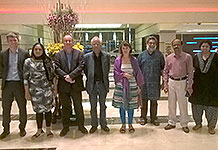Articles

A delegation from Humanities visited NIAS.
College of Humanities looks to the future with NIAS Partnership
Since 2012, the College of Humanities has enjoyed a successful partnership with the National Institute of Advanced Studies (NIAS) in Bangalore. Between January 11th and 13th, a delegation from Humanities visited NIAS to discuss the progress of our relationship so far and build for the future.
NIAS is an institution that conducts advanced research across a multidisciplinary range of subject areas. The Institute brings together academics, industry leaders, and key figures from public affairs to tackle some of the major challenges facing India and the world.
Exeter and NIAS have benefitted from a successful split-site PhD programme based around the theme of ‘Intangible Histories.’ Since the scheme began in 2012, 16 Exeter PhD students from Drama and Archaeology have had the opportunity to work with NIAS. Each student has a co-supervisor based at NIAS and can access outstanding resources at their Bangalore campus, allowing them to work on a range of topics related to Indian society and culture. 2016 has seen students from the first cohort to begin the split-site programme in 2012 graduate with their PhDs, with further students expected to complete their studies this year.
The visit provided an opportunity to discuss the split-site PhD programme, looking at how Exeter and NIAS can continue to work together in the future. In addition, the visit also provided an opportunity for Exeter and NIAS to discuss the potential for new research collaboration. Prof Cathy Turner from Exeter’s Drama Department led a meeting with NIAS colleagues to discuss the potential for submitting a joint grant application, whilst Professor Andrew Thorpe delivered a public lecture entitled ‘Post-Brexit British Politics in Historical Perspective.’
Professor Andrew Thorpe, Pro-Vice-Chancellor and Executive Dean of the College of Humanities, said of the visit, ‘Over the past five years, Exeter and NIAS have developed a strong relationship which has not only benefitted a significant number of PhD students, but which has also provided us with a valuable research partner with whom we can address some of the major global challenges in India and beyond. This visit has allowed us plan ahead, by mapping how we can take our relationship with NIAS from strength to strength over the next few years.’
Date: 24 January 2017
